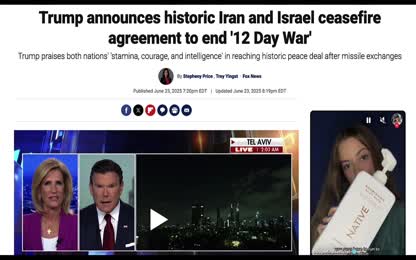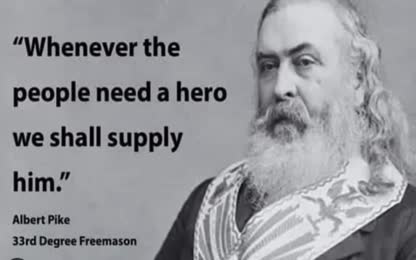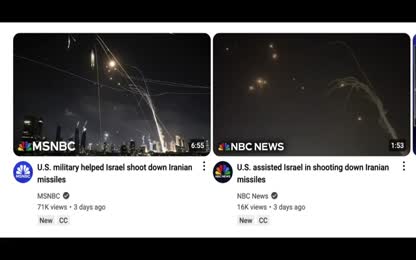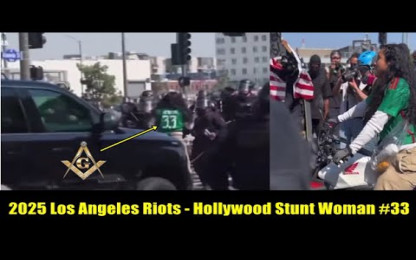Advertisement
Operation Hollywood: How The Pentagon Shapes And Censors The Movie Industry
Mass Mind Control known as Entertainment
Every year, Hollywood producers ask the Pentagon for help in making films, seeking everything from locations and technical advice from Blackhawk helicopters to nuclear-powered submarines.
The military will happily oblige, it says in an army handbook, so long as the movie "aid[s] in the recruiting and retention of personnel."
The producers want to make money; the Defense Department wants to make propaganda. Former Hollywood Reporter staffer Robb explores the conflicts resulting from these negotiations in this illuminating though sometimes tedious study of the military-entertainment complex over the last 50 years. Robb shows how, in the Nicholas Cage film Windtalkers, the Marine Corps strong-armed producers into deleting a scene where a Marine pries gold teeth from a dead Japanese soldier (a historically accurate detail).
At its worst, the author argues, the Pentagon unscrupulously targets children; Robb reveals how the Defense Department helped insert military story lines into the Mickey Mouse Club.
To help, Robb suggests a schedule of uniform fees by which producers could rent aircraft carriers, F-16s & the like. It's an intriguing idea, though producers can go it alone: as Robb points out, blockbusters Forrest Gump, An Officer & a Gentleman & Platoon were all made without military assistance.
studios in the post-Top Gun era instituted an unstated rule telling screenwriters & directors to get military cooperation "or forget about making the picture.", 25 years later, how 'Top Gun' made America love war http://tinyurl.com/3v89xqm -- U.S. Army Commercial Targets PG13 XMen Audience --
The Pentagon Channel presents "The Reel Military. Straight from the war-horses mouth. -- Act Of Valor Film Described As 'Beyond Propaganda' -- Nobel Peace laureates vs NBC scandalous reality show Politics & Hollywood's images are linked. They reinforce one another. Policy enforces mythical images; mythical images help enforce policy.
Jack Valenti, president of the Motion Picture Association of America, has said, quote, "Washington & Hollywood spring from the same DNA," end-quote.
- Category: Tavistock / Esalen Institute,Conspiracies / A secret plan ,Hegelian Dialectic,War/MilitaryIndustrialComplex
- Duration: 52:27
- Date: 2019-05-06 15:51:48
- Tags: no-tag
0 Comments
Video Transcript:
I want you to remember that no bastard ever won war by dying for his country. You want it by making the other poor dumb bastard die for his country. And all this stuff you've heard about America not wanting to fight, wanting to stay out of the war, is a lot of horse down. Americans traditionally love to fight. All real Americans love the sting of battle. When you were kids, you all admired the champion marble shoe to the fastest runner, big league ball players, the toughest boxers. Americans love a winner and will not tolerate a loser. Americans play to win all the time. I wouldn't give a hoot and hell for a man lost and laughed. That's why Americans have never lost and will never lose a war because the very thought of losing is hateful to America. The Americans like war movies because war movies have heroes and villains. Americans love heroes and they love villains and war movies have both. There's conflict, there's drama, there's violence, there's action. And the good guy always wins. That's the key. I was a reporter at the Hollywood trade papers for 20 years. I was the labor legal investigative reporter and I was interested in organized crime and discrimination against minorities, the blacklist, a lot of things. But this was always something I was interested in because I'd always heard that filmmakers who want military assistance have to give their scripts and I thought, well gee, I wonder if there's any paperwork on this. So I started looking into it and I found that there are tens of thousands of pages of documents. The correspondence between the producers, internal memos are written by the military and I love documents and this is a book and a story that can only be told with the documents. So I just became obsessed with the documents and the documents are really startling. This is a TV show from the 1950s, a very popular TV show in America called Lassie about a little boy and his dog. Lassie. Lassie. They did several shows that had to do with the military and the military had all kinds of suggested changes in the stories. It was an episode called Timmy versus the Martians. The little boy thinks he's a contacted Martians and there was a plane crash. In the original story, the army came out and did a test and picked up all the pieces of the crashed airplane and they took it to the wind tunnel and tested it and they determined that the reason Lassie howled was because it heard a she heard a high pitched vibration in the wing that was a malfunction in the design of the airplane and it lassied and now saved the day because of Lassie howling. They knew what the problem was and now they could fix all the airplanes so this wouldn't happen again. But when they asked the military for assistance, all they wanted was some standard footage of a Cessna airplane where his connoisseurs military aircraft. They said no, we won't help you unless you change the script to make it so that the airplane was not faulty. There's no problem with the aircraft. So these are their no-trade here. These are the military notes to the producers of Lassie. We have also reviewed the Timmy versus the Martins. We have reviewed the script and the interposent objections except that we strongly recommend that you change the circumstances of the airplane crash. They don't want children to get the idea that the military makes faulty equipment because children are the main targets of the recruiting efforts because they make children like the army, like the military, like everything about the military and so when they grow up they'll want to join the military. And over, the documents are full of statements where they are targeting children to be future recruits. The children and the people who see these films don't know that this is an advertisement for the military. We generally allow themselves to be involved with Hollywood because there are already spending tens of millions of dollars every year on making promotional commercials to try and get recruits. On the other hand, we in Hollywood just want to make a bigger and better movie giving the audience more bang for their buck. So it's not hard to see what we're trying to get out of it. The vast majority of people around the world have never lived through war. While some have witnessed its horrors, few have actually participated in combat. Most of our ideas about war come from watching movies, above all, American movies. Hollywood has never stopped filming visions of war in all its possible forms, scales and past wars, present wars and future wars. These are just some handful of films that went through the Pentagon approval process. This is behind enemy lines, full cooperation, G.I. Jane, no cooperation, full metal jacket which showed soldiers killing Marines, killing other Marines, no cooperation. 13 days, no cooperation. Top Gun, great film for the Navy, full cooperation. Platoon, no cooperation in the military hated that movie. Three kings, of course, showing the soldier stealing gold from the Iraqi's no cooperation. Patent, of course, they love this picture, full cooperation. Pro-Hiber, again, full cooperation. How long is America going to pretend the world is not at war? From Berlin, Rome and Tokyo, we have been described as a nation of weaklings and playboys who hire British or Russian or Chinese soldiers to do our fighting for us. I'm going to the war. 1941, a date which will live, then infamy. Pro-Hiber was a really boring, romantic view of the events leading up to in the day of the attack. It was a typical Jerry Brokheimer recruiting poster for the military. We are at war. Perhaps the worst thing about the collaboration between Hollywood and military is not the censorship that goes into the films, but the self-sensorship. When you know that you're going to need the military's assistance and you know that they're going to be looking at your script, you write it to make them happy right from the beginning. I mean, it is so terrible that you don't really have to know much history to recognize it's absurd. I mean, some people who don't know anything will think it's history, and this is part of the problem, because if it was called Tennessee, which was the working title, then it's a fictional story. It's a love story, and Michael Bay said he was making a love story as long as Pro-Hiber wasn't too far in the background, because he loved to blow up ships. But if you're going to call Pearl Harbor, then there is a presumption that this is about Pearl Harbor. In the late 1920s, the American War Department created an office to act as a bridge between the motion picture industry and the armed forces. We understood that Pearl Harbor was going to be essentially an action picture with an element of romance. It was not going to be an attempt to replicate history as a documentary drama. So we understood that. We did not enter into our relationship on Pearl Harbor with any illusions that this was going to turn out to be a kind of man for all seasons. It was not advertised to be that way. The filmmakers didn't pretend that it was going to be that way. So we knew that to some extent history was going to be the sacrificial victim in the service of drama and action. But what we did believe, and I think that was born out quite considerably, was that the film would awaken or reawaken interest in the period, and in the survivors who were dying off by the hundreds of thousands. And we were quite gratified in fact that up to the release of the picture, and long after the release of the picture, an enormous amount of intention. In fact, more attention paid on Pearl Harbor, the survivors, the combatants, than during the 50th anniversary of the attack on Pearl Harbor by a substantial margin. From the earliest days of motion pictures, the American armed forces understood the importance of encouraging the production of films about war and combat. In helping to make wins, the first major cooperation between Hollywood and the Pentagon, the military went well beyond its role of technical adviser and became directly involved in the logistics of the production. Between the first and second world wars, American war move is celebrated the bravery of its soldiers and gave the armed forces an aura of invincibility. The war was a great struggle for the people of the country. The war was a great struggle for the people of the country. The war was a great struggle for the people of the country. The war was a great struggle for the people of the country. In the beginning of 1941, Hollywood joined the war effort. By 1943, over 26,000 members of the film industry were serving under the American flag. Never before had Hollywood and the military been so close. In the group Moral, all sectors of the industry from artists to technicians were called to lend a hand. The army enlisted several Hollywood veterans to film the war. John Ford followed the events in the Pacific, William Wiler and John Sturgis, the aerial battles in Europe, and George Stevens, the D-Day landing. Among these films of undeniable courage and generosity, one in particular stands out as an unforgettable statement about the reality of war. And yet for over 30 years, it was banned in America. The guns are quiet now, the papers of peace have been signed, and the oceans of the earth are filled with ships coming home. In far away places, men dreamed of this moment, but for some men, the moment is very different from the dream. Here is human salvage. The final result of all that metal and fire can do to violate mortal flesh. Some were the badges of their pain, the crutches, the bandages, the spints. Others show no outward signs, yet they too are wounded. The psychiatrists listen to the stories of the men who tell them as best they can. The names and places are different, the circumstances are different, but through all the stories runs one threat, death, and the fear of death. Throughout the 60s, Hollywood continued to celebrate the military feats and traditional heroism of American soldiers during World War II. The perfect example of a just war. The longest day is one of the most important films to come from this period. It represents a high point in the relationship between Hollywood and the Pentagon. Never again would they achieve the same level of mutual cooperation. But these images shot by George Stevens at the liberation of the Nazi concentration camps remain a shocking counterpoint to Hollywood's heroic visions of war. The story of the war between the Nazis and the Nazis and the Nazis. There's one thing that you man will be able to say when you get back home. And you may thank God for it. 30 years from now, when you're sitting around your fireside with the grandson on your knee, and he asked you what did you do in the Great World War II? You won't have to say, well, I shuffled shit in Louisiana. All right, now you son-to-bitches. You know how I feel. Well, I will be proud to lead you wonderful guys into battle anytime, anywhere. That's all. Americans on one level deny that they like war and therefore violence. It's a piece of loving people. But the US was created out of violence and American revolution. It was preserved in the Civil War. Its expansion came through violence. And then in World War I and World War II, it made the world safe for democracy using violence for good means. And my argument is that Vietnam became so traumatic not only because we lost, but it was revealed that we really loved violence. And that's one of the reasons we got into the war. We can win. We've always been able to win a little bit of violence and we've won. And it didn't work. And so it was more traumatic than just that we lost. Why, most young Americans, born into a land exultant with hope and with golden promise, tall and suffer and sometimes die in such a remote and distant place? The answer, like the war itself, is not an easy one. But it echoes clearly from the painful lessons of half a century. Three times in my lifetime, in two world wars and in Korea. Americans have gone to far land to fight for freedom. We have learned that a terrible and a brutal cost, that retreat does not bring safety and weakness does not bring peace. And it is this lesson that has brought us to Vietnam. I think Americans thought Vietnam would be like World War II. I'm not sure the movies made that great a contribution to it. I think that may be an exaggeration. I believe that with Vietnam, what happened is that our leaders lied to us. And when you have leaders who lie to you and they lie to themselves about Vietnam, then the public is going to go along with it because there's a natural trust of the leadership and to the leadership proves untrustworthy. Eventually, Lyndon Johnson lost a trust of the country. There's indications that that may happen to George Bush. You cannot go to war lying about why you're going to war. In this country, there are still of you that the Vietnam War could have been won. The people currently in power in Washington. The president of the United States, his captain, chaining, all these people, believe that that war could have been won. They believe that it was okay to lie about the people in order to get that war to be won. That attitude, that view is what's being sold in Hollywood and elsewhere. Now, in order to get movies that are favorable to the United States and the celi idea that it's okay for young men to go and women to go off and die in war. That that's acceptable. To be a superpower, there's a basic belief that you must glorify war in order to get the public to accept the fact that you're going to send their sons and daughters to die. That is a very cynical way to run a government. And in the end, it will bite you because if there's no serious effort to explain to the public why you're going to war or if you lie to the public, it will catch up with you. As America sinks into the quagmire of Vietnam, the movie industry begins to lose interest in representing war on screen. After such films as Patton, Mash, Catch 22 and Toro Toro Toro, Hollywood brings the production of war films to a halt. America's defeat in Vietnam leaves the country traumatized and unwilling to address the subject of war for some time. With one exception, the Green Bear Aid. The Green Bear Aid was a project that John Wayne had wanted to make. And he got, he sent letters which I have to Lyndon Johnson asking him to help get the military to assist, which Johnson did. They rolled out the red carpet. They gave everything to the filmmakers for free. But after that, the problem was that the filmmakers did not come into the Pentagon requesting help until after the war was over. Because, again, Hollywood's interest in making money, the war had become controversial. They didn't know when it was going to end. They didn't want films laying around the show to war that was over. So, the issue wasn't how Vietnam changed the relationship during the war. It was what happened afterwards. And what happens afterwards is that the media has savaged the military, particularly the army and the Marines for their atrocities, etc. And so, when the scripts come in, the scripts that do come in reflect the filmmakers' perceptions of the war. Military argues they're in not in any way correct. And therefore, there is no way we're going to cooperate. The first real casualty of war is innocence. The first real movie about the war in Vietnam is Blatoon. Blatoon became a sociological phenomenon. Now, whether it was just that the nation was ready for a healing between its Vietnam veterans and the society that essentially denigrated them, essentially neglected them when we came home, or whether it was just such a terrific film that it brought people out of their reserve. It melted the ice. I'm not sure. And that's not important. What is important was that what we brought to the screen in Blatoon served to essentially thaw the frees that was on between America's Vietnam veterans, their families who knew nothing about the experience in Vietnam, and even those who were against the war in America. The film that stands as the most extraordinary testimony of the military experience in Vietnam, as well as one of the greatest war films of all time, is undoubtedly the work of Francis Ford Coppola. Inspired by Joseph Conrad's heart of darkness, Apocalypse Now tells the story of the voyage of an American officer up the Maicon, on a mission to execute a colonel who has spiraled out of control. You got damn it, you'll do what I say. During his voyage, Captain Willard witnesses the destruction of Vietnamese society, while the American Army sinks collectively into madness, absurdity and horror. Apocalypse Now transforms the Vietnam War until America's collective experience of evil in the name of the Great Fight against communism. Watch it over here, Chief! Here's a film that works on so many different levels, as a for the time, complete reassessment of America's involvement in Vietnam, and the raison d'etre and the ways in which that war was fought. It's an allegory, it's very much a personal film. It's a film that is realistic in its presentation of the futility of war, it's a film in which we find ourselves being lost in the story, and yet constantly reminded of things that we should always be reminded of, and that is that, you know, war is hell, its madness, we're better to avoid it under any circumstances. It's the ultimate war movie. If you're going to categorize pictures that we didn't work on, I would create two categories. Category 1 is the picture that has the fundamental show-stopping premise. Apocalypse Now, an officer is sent out to assassinate another officer. Crimson type, an armed mutiny aboard a nuclear submarine. Once you have a fundamental show-stopper, there's really little point in pointing out that the ribbons are wrong or the haircuts are not quite right. Any film that's a good film, I think, will show the war is not the answer. Any film that the military assists always says that war is the answer, and every film that the military assists is worse than any film that they don't assist. If you had a list of all the films that the military refused to assist, and compared those to the films that they did assist, it's like night and day. The films are so much better when the military is not involved, because you don't have this sensor telling you what to write. You have artists presenting their image, not the military's image. After Vietnam, America enters a new era of peace. The Pentagon, invests in technological research, convinced that the safety of its borders and its capacity to intervene depend on technological superiority. 10 years after their divorce, Hollywood starts to offer the Pentagon stories about the technological image it's looking to promote. The film that brings them together once again is fittingly an enormous commercial success. The film that brings them together once again is fittingly an enormous commercial success. I'm going to send you up against the best dessert, you two characters are going to top gun. I feel the need for a speed. Five weeks you're going to fly against the best fighter pilot in the world. You guys really are, Cal boys. It's my belief that top gun was a milestone picture because it signified the rehabilitation of the military as acceptable subject matter in a positive context. It showed to me and to great many other people that you could make a film that portrayed the military, the US military in a positive way, and make money and not become a pariah in Hollywood. I'm not saying it was the first picture to do that, but I'm saying it was the most important picture to symbolize that change in public opinion. It's a strong one. After 10 years of self doubt, America can make a fresh start and begin to imagine a future that may involve military interventions beyond its borders. When the Gulf War breaks out three years later, the American public with images of top gun fresh in mind has no reason to doubt its victory. It was a highly sophisticated, highly technological war. Having learned its lesson from Vietnam, the American army took every precaution to control the images which reached the public. No more bodies would be seen, no more direct human suffering. As in a video game, the images of contemporary warfare became clean. Is it possible for the movies to present a balanced representation of war if America dominates its adversaries in every way? Such a demonstration of superior strength makes dramatic tension hard to sustain. Perhaps that explains why Hollywood made so few films about the Gulf War. In the 90s, a new cycle of films imagines all the ways the enemy might sneak through gaps in technology in order to take advantage of the weaknesses of the American defense system. These films anticipate a new era in which war becomes asymmetrical. About 10 years ago, it just seemed so obvious that the next big conflict was going to be a conflict between non-aligned soldiers and the enemy of so many people in their minds, America. It's no accident that terrorism was already the front page headlines in the movies long before it became front page headlines in the New York Times. The Sajan Hubbard FBI. What I propose is that you let these people go and I'll take their place. I'm going to take your silence to mean that you're considering my offer. Oh, oh God. The Belfast, they root. We're not the first city to have to deal with terrorism. This is New York City. We can take it. It's interesting in that if you imagine a melodrama, one needs to have an antagonist and that antagonist has taken many faces over time, it didn't take a huge act of imagination to be aware of what was happening in Europe with that kind of radical fundamentalism and to see that there were so many places that were already dealing with the issues that I was addressing. So I wasn't making it up out of whole cloth and it was easy to point to that. But the sensitivities of the Arab American community were something that was new and something that the film had directly with. Today was the invocation of the War Powers Act by the President. I'm declaring instead of martial law in this city. We intend to seal off this furrow and we intend to squeeze it. Do you have any idea what you're starting here? Wrong. What is what they really want is for us to hurt children in the stadium like we're doing and put soldiers on the street and have Americans looking over their shoulders. Been the law. Tread the Constitution just a little bit. We do that and everything that we have played and fought and died for is over. Don't you ever again question my command? Is that clear? I'm not on the U Command General. Take a look around and tell me if you really think that's true. I've aspired to try to talk about violence and its consequences. I've tried to talk about the fact that history is made up of people. There are winners and losers that there is a price to be paid and that nothing happens absent its resonance and its consequences. Those films that I have objected to personally or politically are those that seem to objectify its participants and exploit the violence and exploit war. To suggest that it exists without political context and without human consequence. Not surprisingly, the Pentagon refused to cooperate on Edward Swixfilm, the siege. Any aspect of the script that deals with military ethics, the behavior of soldiers and officers in times of peace and war is the object of particular scrutiny by the liaison officers who look at the scripts proposed by the studios. There are many subjects and themes that draw their attention and the different possible reasons for denying cooperation constantly evolve. Often the special assistant to the Secretary of Defense for entertainment media will receive a script concurrently with my office. I'll do a sort of peripheral read where I just kind of get the main points and see where does it have the army. That's the first thing I look for is the first specific army or military mention. I'll sort of make notes. We're here. The second time I'll go through and read it with a bit more critical eye. How would that soldier really behave in that situation? What sort of language is this soldier using? How is the soldier viewed by the civilians in the picture? What is the mood of the piece? And I go by it step by step until I can get through it and it'll be a script similar to this one that's full of notes. First of all, when we look at scripts, are we conducting damage control and the answer is absolutely. It's not my role here to vilify the armed forces because I'm a believer of the armed forces. I wouldn't be in this job if I didn't. And my colleagues feel the same way. Those who are in the military obviously are adherents. Otherwise, they would vote with their feet and quit. So we are all very much of the opinion that the military is an institution for the betterment of the United States. So any picture that's contrary to that fundamental premise is going to be a problem for us. I just wonder how many of the 600 Americans have been killed in Iraq joined the military because they saw some movie when they were a kid that they'd say, oh, I want to join the military. I saw this movie that looks great. How many of the dead 600 Americans joined the military because of some movie that they saw, not knowing that the military was the ones that were behind the scenes, manipulating the country and the script to make the military look better than it really was. Once they got to Iraq, it was too late. It wasn't also glamorous over there. When you use the military for propaganda and the American public sees it all the time, the sensitivity to which real and what's not real is lost. And because our movies are shipped around the world and everybody sees them around the world, that sensitivity may be going elsewhere. And what happens when that takes place is that when a life is taken, you care a little less. When you lose somebody, you care a little, oh, that's war. You know, we get this sort of very tough attitude. And I'm afraid that's what the movies are doing. This is the Wind Talker script, the original script. And this is page 51 is the character of the dentist. And the description says, bit over a dead Japanese soldier doing what he does, relieving the dead of the gold in their mouth and then the dialogue for the dentist is, come to Papa. The dentist twists his band at struggles to get the gold and not get out of the corpse's teeth. He's homestead and arrested the second assault coming to the slope. Well, this was a big problem for the Pentagon. They didn't want anything like this in the movie. This is an internal memo from the Marine Corps Film Office Captain Matt Morgan to Phil Strue, saying, page 51, the dentist digs gold from the jaws of corpses. This has to go. The activity is unmarried. And Phil Strue, his boss at the Pentagon, wrote, stealing gold teeth. Yep, has to go. The dentist character displays distinctly unmarried behavior. He is, in fact, committing an atrocity. Well, they don't want that shown in a film that they're cooperating with. So the producers agreed that they would take it out. So the entire character of the dentist was eliminated from the film. It's no longer in there. As we see from the film, the real actual footage, Marines really did this during World War II. There is actual footage of Marine with a pair of pliers pulling the gold teeth out of dead Japanese soldiers' mouth. This is the real face of war. Not the idealized heroic version of the Pentagon wants to project. My objection is not to filmmakers altering history. Filmmakers' art is manipulable. And filmmakers can say whatever they want. They can say something that's absolutely false. But when the military starts dictating the content of art, and saying what the, what history is, and their idea of history, well, we know that's completely false. And one of the great examples is what they tried to do the film 13 days. The filmmakers are trying to stick very close to real history. They had the actual Kennedy. Before Nixon was taping in the White House, Kennedy was taping in the White House. And we can actually hear at the John of Kennedy Library website, you can listen to the actual tape recordings that Kennedy was having during the Cuban Missile Crisis. That was not good enough for the military. They did not want a real picture of what the military was advising which would have taken us down to the path of World War III. They wanted a much more sanitized version, and they would not assist Kevin Passener and Peter Almond in the producers of 13 days, because it showed too much the real history of true facts to what happened. But if launched, those missiles from Cuba would kill a lot of Americans. The very presence of those missiles gives the Soviets first right capability. Those missiles make a nuclear exchange more likely. And that is why I'm being such a pain in the ass about destroying them and destroying them immediately. Hell even Mac agrees. And sir, given your own statements about Cuba, I think a blockade or a bunch of political talk be considered by a lot of our friends and neutrals as a pretty weak response. I suspect that many of our own citizens might feel the same way. You're in a pretty bad fix, Mr. President. What did you say? You're in a pretty bad fix. Or maybe you have noticed you're in it with me. Now, General, what are the Soviets going to do when we attack? Nothing. Nothing. Because the only alternative open to them is one they can't choose. You know, they're not just missiles. We're going to be destroying, General. If we kill Soviet soldiers, they're going to respond. I mean, how would we respond? If they kill hours, no, they're going to do something, General. I can promise you that. Those goddamn candidates are going to destroy this country. If we don't do something about this. There's a little to say about 13 days. We met with the filmmakers. We walked around the building a little bit. We chatted. I pointed out to them that the script was... Oh, I guess they were writing the script at that point. I'm not quite sure. I don't remember exactly where we were. I guess at that point they hadn't written the script yet. And I think I had discussion with the director. And I think he conceded that he was going to take some artistic liberties with history, which is not surprising. That's what everybody does. But when we got the script, we found that it was just impossible. It was so unrealistic. And we sort of did this. You know, my historian is smarter than your historian. And we kind of went back and forth. And they insisted that things had happened. That my historian said did not happen. And particularly over some of the portrayals of MacDamer and his relationship with the whole White House versus the military. I mean, we felt that the overall... The purpose of the military in the 13 days was to serve as a thuggish malign presence against which the Kennedys could glow in contrast. This is a letter from Phil Strube to the producers of 13 days from July 1998, where they told them that they're not going to give them assistance for this film. They're saying that they won't help them because both General Amé and General Taylor are depicted in a negative and inauthentic way as unintelligent and bellicose. But in fact, that's exactly what they were. The two generals were very belligerent. They wanted to go to war. They wanted to attack Cuba. The record is clear on that because they have tape showing it. The United States established the First Amendment of the Constitution as one of the keys to the American system of democracy. It's important to note that when the framers created our Bill of Rights, the very first thing they guaranteed was freedom of speech and freedom of the press in the First Amendment. The United States protects speech to a level that I think is unprecedented around the world. We have shortcomings. But one thing that we can point to with pride is the First Amendment. And the courts have historically always been highly protective of the First Amendment. The problem is one of method in that the military wants to shape the message, but they know that they can't do it directly. They can't use a stick. If they go after a filmmaker who puts together a negative film, the courts will immediately shut them down. So instead of using a stick, they dangle a carrot. And they say that if you work with us, if you change your film, we'll save you millions of dollars. We'll give you access to aircraft carriers, film footage, US personnel. We'll even set off ordinance. So it looks like a real war instead of those computer-generated things. The Pentagon is like a giant white shark that public relations be sheet over there. It just moves through the water, looking at targets of opportunity, ingorn, snap, snap. And that's not going to change. Congress is interested as they want to look patriotic and they want to get reelected. So they're not going to stop it. And the commercial media, which by the way, they do the vertical integration of the media, the fact that these media companies that now own the movie studios, now own the TV networks and the book publishers are looking much less critically at all these issues because they can profit by this. So there is no large opposition to what they are doing. And therefore, I think it may get worse. And the only thing I can tell the viewers, the people who are the end users of these products, when you see these kinds of films, understand you're looking at government propaganda. As the American will in favor of our involvement in these pictures, I have no way of knowing because there have never been any surveys. But I can tell you one thing. Their elected officials are certainly not opposed to it because it's nothing that we keep quiet or secret. We don't advertise it. We don't choose to try to be prominent to gain attention for ourselves. The affairs world wants to stay behind the camera, not in front of it. But there's certainly nothing that we're hesitant about. We're not ashamed of their relationship. Nor have we ever heard any complaints or any requests to modify it from the elected officials of the American public. So I can only say that, though we may get an occasional letter saying, why did you work on this picture? Why did you work on that TV show? Most of those we didn't. They just think we did. Americans have no bloody idea who Phil Straub is. And yet he has done tremendous work in shaping popular culture. They wouldn't like it. I mean, if you told them who Phil Straub was, they wouldn't like it. They wouldn't like what he does or what he represents. But that's the point. Nobody tells them. I do solemnly swear. To support and defend the Constitution of the United States. Against all enemies, for the messengers of the healthy God. I was once told by a commanding officer, it's not a question of if we go to combat. It's a question of when. And you have to ask yourself, will you please tell me what you're doing? I'm not going to say that. I'm not going to say that. I'm not going to say that. I'm not going to say that. It's a question of when. And you have to ask yourself, will you be prepared? Since no films have come out of Hollywood about Iraq or Afghanistan, the military has decided to take the initiative. After 9-11, their approach to their image has radically changed. The whole team, after that, will bring the table maybe more in. The Navy Marine Corps team allows us to... The result is this new type of short documentary. Made to look like Hollywood movies and intended to be shown in theaters like movie-tone newsreels of the past. In 2016, 18 hours a day or more if you're doing combat in some cases. And if you want to smile on your face, they want to do stuff that's important for their country. But in this case, there is no screenwriter or director. Not even a journalist. No more intermediaries. It's the soldiers themselves that do the filming with a camera in one hand and a rifle in the other. conquering the script Spirits and prohibitions Inf The Dep brauch Anybody can take a video camera and point it. But to go out and also to be under fire as you've seen from the films, you know that's not Hollywood that's real. I mean these guys were going in front of librarians missiles tanks. And there's no games and there's no retakes and there's no reshoots and there's no reshoots, they had to get it and their mission was to get the shots in the best, with the best visual content of the background, to the foreground, to whatever that they could possibly get. Propaganda is creating it for you to do something. This isn't, this is telling you something that happened. I'm not asking you to do anything whenever you watch this, it's documenting what happened. The goal is really simple, for every person in America to see it. The message, there's people overseas protecting your freedom of speech. That's it. There could be nothing more poetic, nothing more symbolic than the US military supporting an anti-war film. And that's the great loss. These offices could, in fact, be the finest moment for our system, to show that the US military is there to protect viewpoints, all viewpoints, even those that don't favor it. But instead, it is yielded to this great temptation. Oscar Wilde once said that the only way to be rid of temptation is to yield to it. And that really sums up to military liaison offices. They have yielded to every temptation great and small to manage the image that appears on the big screen. I'm going to have a close to an object from the York and I'll give him these campaign rivers, the enemy service rivers. National defense rivers have ripple hearts. The brothers and sisters this year. The brothers and sisters this year. The brothers and sisters this year. The brothers and sisters this year. The brothers and sisters this year. The brothers and sisters this year. The brothers and sisters this year. The brothers and sisters this year. The brothers and sisters this year. The brothers and sisters this year. The brothers and sisters this year. The brothers and sisters this year. The brothers and sisters this year. The brothers and sisters this year. The brothers and sisters this year. The brothers and sisters this year. Möterbrilholt.










 Donate
Donate







